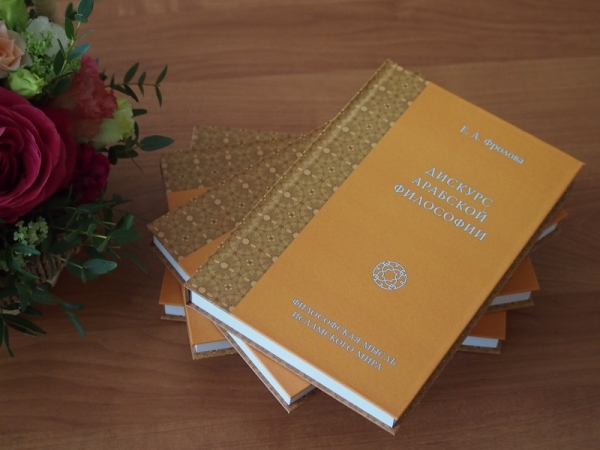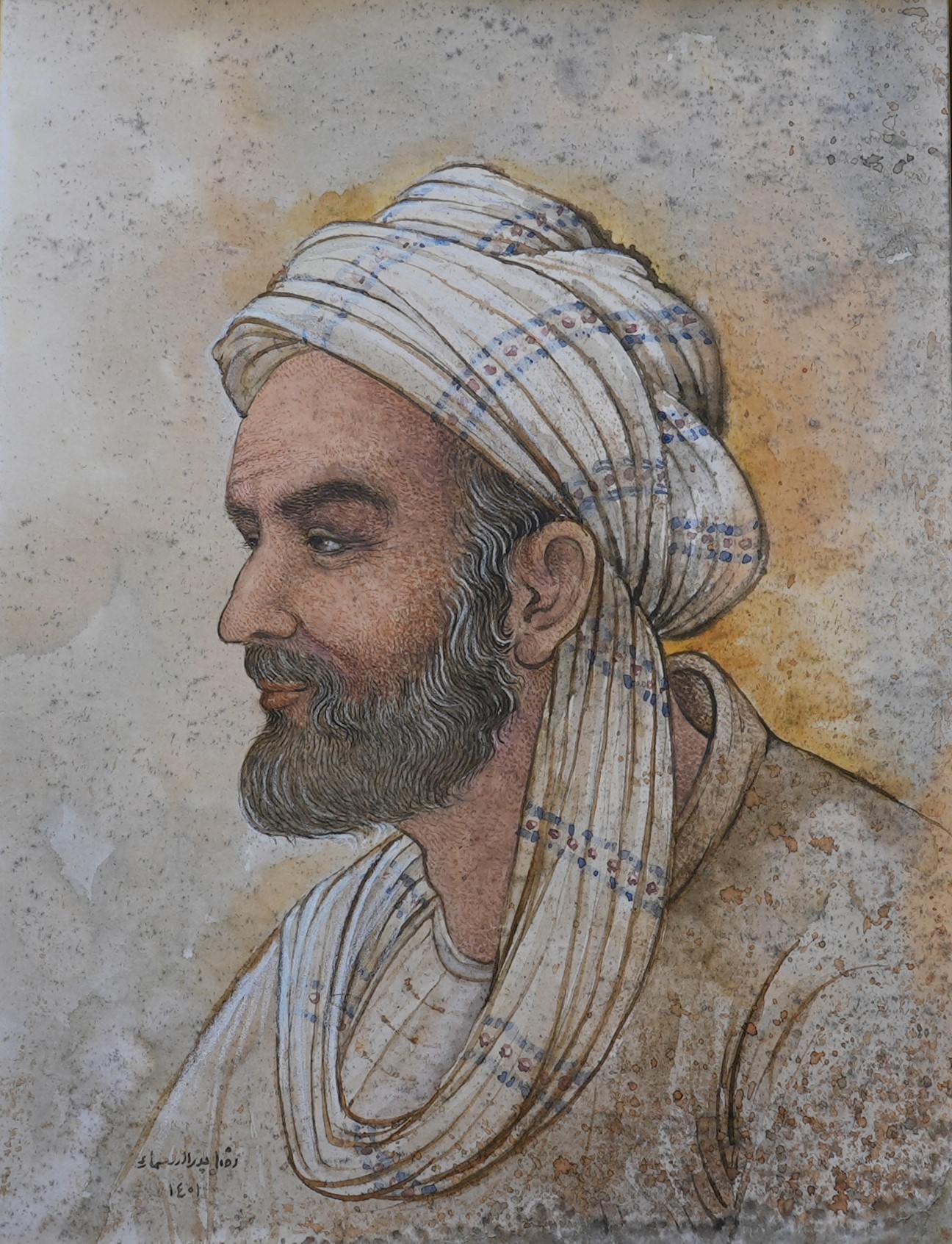On the 14th April 2016 the Institute of Philosophy of the Russian Academy of Sciences with the support of the Islamic Culture Research Foundation hosted the presentation of the “Discourse of Arab Philosophy”, a book written by a famous Russian philosophic historian, Evgeniya Antonovna Frolova.
Both recognized and young researchers attended the roundtable discussion. Among them there were experts not only in Islamic world’s philosophy (A. V. Smirnov, I. R. Nasyrov, R. V. Pskhu, Yu. E. Fedorova, A. A. Lukashev), but also experts in Jewish (K. Yu. Burmistrov), Western (Yu. V. Sineokaya) and Indian (M. T. Stepanyants) philosophy.
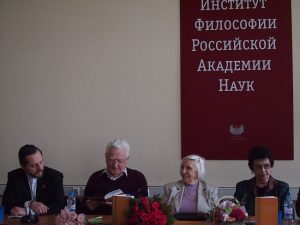
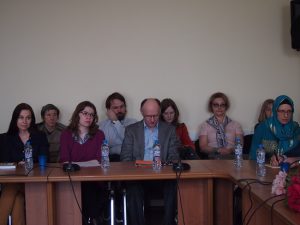
The event was held as a one-day academic conference under the name “Arab Muslim philosophy: topical research”.
The opening speech was made by A. V. Smirnov, Director of the Institute of Philosophy of the Russian Academy of Sciences. He described the fruitful academic activity of Evgeniya Antonovna, mentioned her merits and some personality traits that, to some extent, helped her write the book.
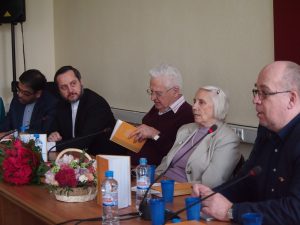
In the photo: A. V. Smirnov (on the right)
After that, the participants proceeded to discussing the “Discourse of Arab Philosophy” and delivering reports.
M. T. Stepanyants presented her review of E. A. Frolova’s book. She noted its extraordinary value, saying that this work covered contemporary research in the field of Arab philosophy, whereas Post-Soviet and Orientalist studies placed greater focus on medieval authors. She also commended the well-chosen topic and unusual presentation. She mentioned that the work could have contained more names of contemporary Arab philosophers, stating their views on certain issues.
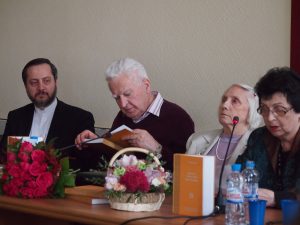
In the photo: M. T. Stepanyants (on the right)
One of the main questions raised at the conference was related to the genre of the “Discourse of Arab Philosophy”. This work cannot be defined as encyclopaedic dictionary or an article due to its unusual structure and style. There is no author in the book, as E.A. Frolova herself put it. This is no coincidence: her idea was to make the Arab thinkers speak from the pages of this work. Finally, A. V. Smirnov suggested calling this book’s genre “a hypertext fractal”, that is a gate to the classic Islamic heritage, which can be compared to an ocean.
After the reviews and the book’s genre were discussed, Mr Saadat, Deputy Head of the Cultural Mission of Iran in Moscow, and A. A. Guseynov, academic adviser of the Institute of Philosophy of the Russian Academy of Sciences, expressed their gratitude to E. A. Frolova.
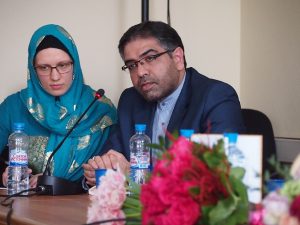
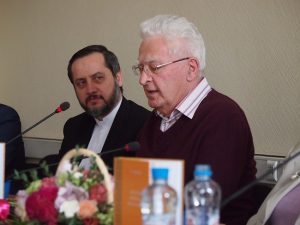
In the left photo: Mr Saadat (on the right); In the right photo: A.A. Guseynov (on the right)
Even though the book was published quite recently, it has already proved useful. Yu. V. Sineokaya, head of the Department of History of Western Philosophy, shared her own experience as a philosophy teacher. Once her Muslim students expressed their dissatisfaction with the fact that she didn’t pay attention to the Eastern philosophy, focusing only on the Western philosophy instead. Yulia Vadimovna decided to comply with their request and promised to devote several lectures to this topic. Therefore, she had to look into this issue. Her colleagues recommended the books of E. A. Frolova to her. After she studied the “Arab Philosophy: Past and Present” and “Discourse of Arab Philosophy”, E. A. Frolova’s books became her desk companions.
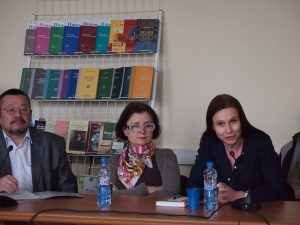
In the photo: Yu. V. Sineokaya (on the right)
After that Hamid Hadawi, President of the Islamic Culture Research Foundation, delivered a speech. He outlined the success that has been achieved in cooperation with the Institute of Philosophy, and noted that to a large extent it was due to A.V.Smirnov and E. A. Frolova’s efforts. Over the last 8 years more than 10 books were published and over 10 conferences were conducted cooperatively. Mr Hadawi also thanked E. A. Frolova for her work and expressed his hope for seeing her new books in the nearest future.
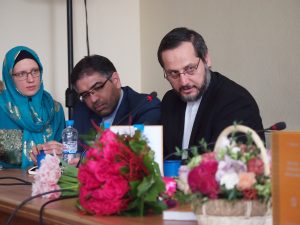
In the photo: Hamid Hadawi (on the right)
Editor in chief of the “Sadra” publishing house, A. B. Gromov, noted that the “Discourse of Arab Philosophy” book was duly appreciated at the latest book exhibitions, and that the whole “Philosophic thought of Islamic world” series, which includes this book, is in great demand among readers.
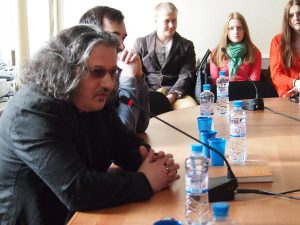
In the photo: A.B. Gromov (on the left)
The conference attendees also delivered a few scientific reports devoted to similarity between Islamic and Jewish thought (K. Yu. Burmistrov), Ibn Haldun’s (I. R. Nasyrov) and Nifari’s (R. V. Pskhu) teachings, Europeans’ view on Muslims and its origins (E. Yu. Fedorova). A. A. Lukashev raised a sensitive issued of jihad and told about the Sufi origins of its understanding.
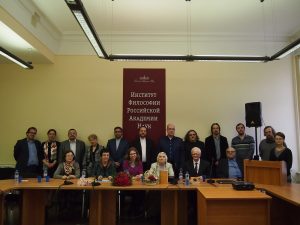
Taking into account the fact that the issues of Arab and Islamic world are a major focus of interest, positive ideas of Arab Muslim philosophers can be used in order to solve them and prevent other problems in the society.


